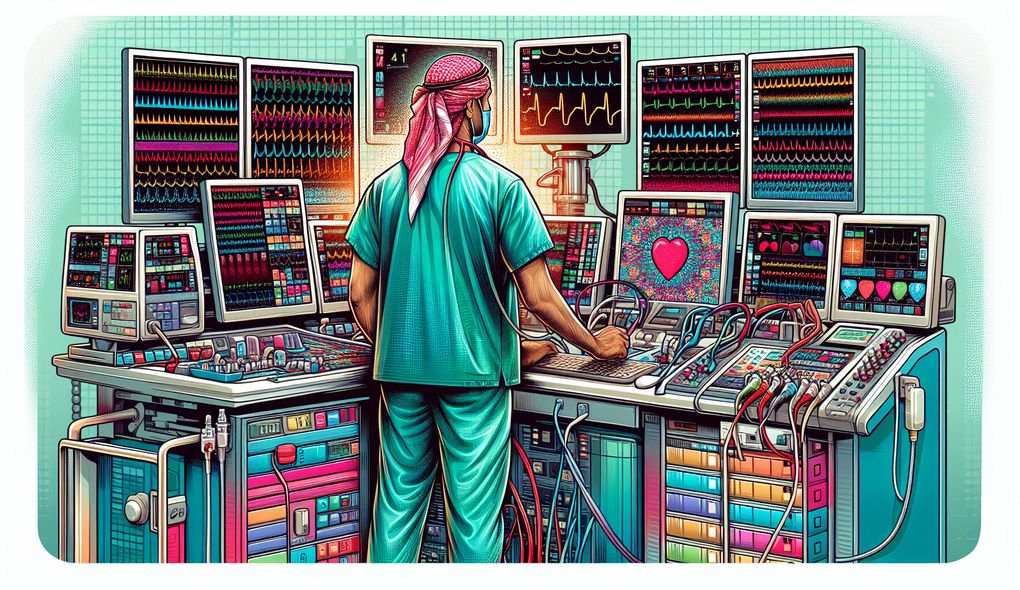Can you give an example of a time when you had to interpret telemetry readings and take appropriate action?
INTERMEDIATE LEVEL

Sample answer to the question:
Sure! In my previous role as a telemetry nurse, I encountered a situation where I had to interpret telemetry readings and take immediate action. One night, I received an alert indicating a significant drop in a patient's heart rate. I quickly accessed the patient's telemetry monitor and observed a bradycardic rhythm. I immediately assessed the patient, ensuring they were conscious and responsive. I called for assistance from the healthcare team and we placed the patient on a cardiac monitor for continuous ECG monitoring. Based on the telemetry readings, we initiated appropriate interventions, including providing oxygen therapy, administering medication to increase the heart rate, and preparing for potential cardioversion if necessary. I stayed by the patient's side, closely monitoring their vital signs and telemetry readings until their heart rate stabilized. Throughout the entire process, I maintained open and clear communication with the healthcare team and ensured accurate documentation of the incident.
Here is a more solid answer:
Absolutely! Let me share a comprehensive example of when I had to interpret telemetry readings and take appropriate action. During a night shift in the telemetry unit, I received an urgent telemetry alert indicating a significant elevation in a patient's heart rate. Immediately, I accessed the patient's telemetry monitor and observed a sustained tachycardic rhythm. I quickly assessed the patient's vital signs, ensuring they were stable, conscious, and able to communicate. Through effective communication with the patient, I gathered additional information about their symptoms, such as palpitations and dizziness. Collaborating with the healthcare team, we determined that the patient was experiencing a supraventricular tachycardia (SVT) episode. Based on the telemetry readings, we initiated appropriate interventions, including administering intravenous medication to control the heart rate and alleviate symptoms. I stayed at the patient's bedside, continuously monitoring their telemetry readings, ECG rhythm, and vital signs. Throughout the process, I reassured the patient, explaining the purpose and importance of the interventions, and addressed their concerns. Additionally, I documented the entire incident accurately and communicated the details to the attending physician during the handover.
Why is this a more solid answer?
The solid answer provides a more detailed example, including specific actions taken, collaboration with the healthcare team, communication with the patient, and documentation. However, it could further emphasize the use of analytical skills in interpreting telemetry data and the candidate's ability to remain calm and efficient in high-stress situations.
An example of a exceptional answer:
Certainly! I can provide you with an exceptional example of when my strong clinical skills in cardiac care and excellent analytical skills for interpreting telemetry data were put to the test. On a busy day in the telemetry unit, I received an urgent telemetry alert indicating a sudden change in a patient's ECG waveform. I immediately accessed the patient's telemetry monitor and noticed a new ST-segment elevation, which was consistent with a myocardial infarction (heart attack). Without hesitation, I quickly assessed the patient, ensuring they were stable and conscious. Collaborating with the healthcare team, we implemented the hospital's rapid response protocol, immediately contacting the cardiologist and activating the cardiac catheterization lab. While awaiting further instructions, I remained by the patient's side, providing reassurance and comfort. Using my comprehensive knowledge of cardiac medications, I initiated appropriate interventions, administering aspirin, nitroglycerin, and morphine, as ordered, to relieve pain and improve cardiac perfusion. Throughout the process, I carefully monitored the patient's telemetry readings, vital signs, and level of pain. Once in the cardiac catheterization lab, the patient underwent an emergency percutaneous coronary intervention, successfully restoring blood flow to the blocked coronary artery. I communicated the details of the incident to the receiving nurses in the cardiac intensive care unit and accurately documented the entire event. The patient made a swift recovery, and their positive outcome was attributed to the prompt interpretation of telemetry readings and the timely initiation of appropriate interventions.
Why is this an exceptional answer?
The exceptional answer provides a highly detailed example, demonstrating the candidate's strong clinical skills, analytical skills, ability to remain calm in high-stress situations, and effective communication and collaboration with the healthcare team. It includes specific actions taken, advanced knowledge of cardiac care, and the successful outcome of the patient. However, it could further highlight the candidate's proficiency in using medical software and telemetry monitoring systems.
How to prepare for this question:
- Review the basics of telemetry monitoring and interpretation, including common cardiac rhythms and their management.
- Familiarize yourself with the hospital's protocols and policies related to telemetry monitoring and emergency interventions.
- Practice interpreting telemetry readings using sample ECG waveforms and scenarios.
- Reflect on past experiences involving telemetry monitoring and identify specific examples to discuss during the interview.
- Develop strong communication skills by practicing effective explanation of medical terms and procedures to patients and their families.
- Stay updated with the latest advancements in telemetry technology and cardiac care practices.
What are interviewers evaluating with this question?
- Strong clinical skills in cardiac care
- Excellent analytical skills for interpreting telemetry data
- Ability to remain calm and efficient in high-stress situations
- Effective communication skills for educating patients and collaborating with the healthcare team

